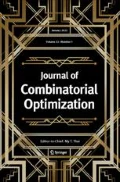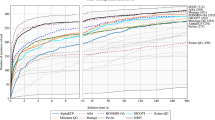Abstract
In this paper, we present a simple algorithm to obtain mechanically SDP relaxations for any quadratic or linear program with bivalent variables, starting from an existing linear relaxation of the considered combinatorial problem. A significant advantage of our approach is that we obtain an improvement on the linear relaxation we start from. Moreover, we can take into account all the existing theoretical and practical experience accumulated in the linear approach. After presenting the rules to treat each type of constraint, we describe our algorithm, and then apply it to obtain semidefinite relaxations for three classical combinatorial problems: the K-CLUSTER problem, the Quadratic Assignment Problem, and the Constrained-Memory Allocation Problem. We show that we obtain better SDP relaxations than the previous ones, and we report computational experiments for the three problems.
Similar content being viewed by others
Author information
Authors and Affiliations
Corresponding author
Rights and permissions
About this article
Cite this article
Roupin, F. From Linear to Semidefinite Programming: An Algorithm to Obtain Semidefinite Relaxations for Bivalent Quadratic Problems. J Comb Optim 8, 469–493 (2004). https://doi.org/10.1007/s10878-004-4838-6
Received:
Revised:
Accepted:
Issue Date:
DOI: https://doi.org/10.1007/s10878-004-4838-6




